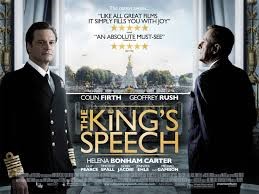“The King’s Speech” and Trying Cases
“The movie “The King’s Speech” is the story of . . . .”
How do I begin to tell you what it is about?
Do I:
give you the history of which King of England is the subject of the movie, or
tell you it is about a speech problem he had and the unique relationship that he and a speech therapist (who had no credentials) developed to mitigate the problem, or
tell you about the likely problems that caused his stammering or the relationship this has to his brother who abdicated the throne to marry Mrs. Simpson?
With mountains of information, visuals, and audio recordings available, how does an author or screen writer:
pick and choose what tells the story best,
order it in an understandable fashion, and
tell the core of the story (in this case, the character and relationship of a King and a commoner and a speech impediment) in a fashion that connects to the viewer?
With mountains of discovery, investigative reports, photos and video available how does a trial attorney:
pick and choose what tells the story best,
order it in an understandable fashion,
and tell the core of the story (in our cases, how the accident or event occurred, the contract breached or employment wrongfully terminated and the damages that were caused and who is responsible) in a fashion that connects to the juror?



